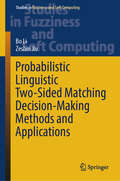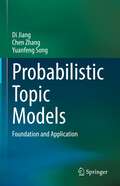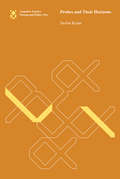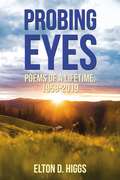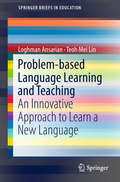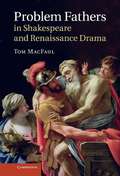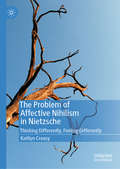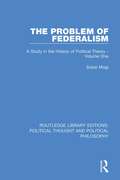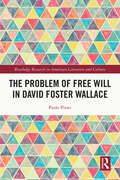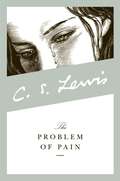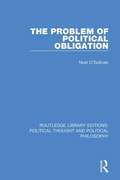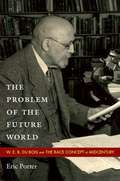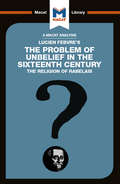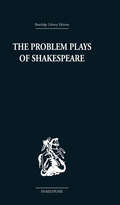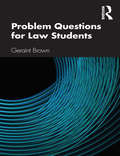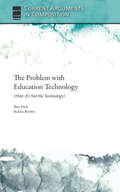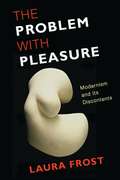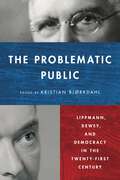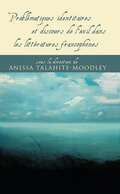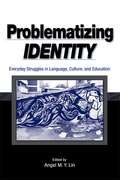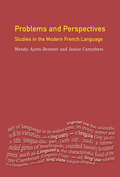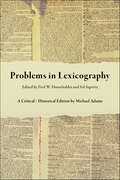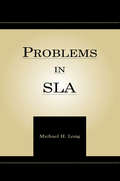- Table View
- List View
Prizing Literature
by Gillian RobertsWhen Canadian authors win prestigious literary prizes, from the Governor General's Literary Award to the Man Booker Prize, they are celebrated not only for their achievements, but also for contributing to this country's cultural capital. Discussions about culture, national identity, and citizenship are particularly complicated when the honorees are immigrants, like Michael Ondaatje, Carol Shields, or Rohinton Mistry. Then there is the case of Yann Martel, who is identified both as Canadian and as rootlessly cosmopolitan. How have these writers' identities been recalibrated in order to claim them as 'representative' Canadians?Prizing Literature is the first extended study of contemporary award winning Canadian literature and the ways in which we celebrate its authors. Gillian Roberts uses theories of hospitality to examine how prize-winning authors are variously received and honoured depending on their citizenship and the extent to which they represent 'Canadianness.' Prizing Literature sheds light on popular and media understandings of what it means to be part of a multicultural nation.
Probabilistic Linguistic Two-Sided Matching Decision-Making Methods and Applications (Studies in Fuzziness and Soft Computing #436)
by Zeshui Xu Bo LiThis book tackles the intricacies of decision-making processes where alternatives stem from distinct, finite sets. Discover the cutting-edge in decision-making with our groundbreaking book on complex two-sided matching methods. Harnessing the power of probabilistic linguistic term sets, it introduces innovative methods that enhance matching efficiency and practicality. It addresses the pressing question of how to navigate and optimize in scenarios with multifaceted matching challenges, offering an exploration into the psychological perceptions of agents through consistency checks and pairwise comparisons. It delves into the unknowns of static matching with multiple attribute weights, extends its scope to multi-sided agent sets in complex matching, and introduces dynamic screening mechanisms to refine the matching process. This book is not just a theoretical exploration. It lays the groundwork for intelligent matching algorithms and group mechanisms, providing actionable insights for technical supply and demand allocation, emergency personnel dispatch, and multi-stage medical management scheme selection. The effectiveness of these methods is backed by comparative analyses and simulation experiments, proving their superiority in real-world applications. Embrace the future of decision-making with our book, a must-read for those seeking to master complex matching scenarios and unlock practical solutions.
Probabilistic Topic Models: Foundation and Application
by Di Jiang Chen Zhang Yuanfeng SongThis book introduces readers to the theoretical foundation and application of topic models. It provides readers with efficient means to learn about the technical principles underlying topic models. More concretely, it covers topics such as fundamental concepts, topic model structures, approximate inference algorithms, and a range of methods used to create high-quality topic models. In addition, this book illustrates the applications of topic models applied in real-world scenarios. Readers will be instructed on the means to select and apply suitable models for specific real-world tasks, providing this book with greater use for the industry. Finally, the book presents a catalog of the most important topic models from the literature over the past decades, which can be referenced and indexed by researchers and engineers in related fields. We hope this book can bridge the gap between academic research and industrial application and help topic models play an increasingly effective role in both academia and industry. This book offers a valuable reference guide for senior undergraduate students, graduate students, and researchers, covering the latest advances in topic models, and for industrial practitioners, sharing state-of-the-art solutions for topic-related applications. The book can also serve as a reference for job seekers preparing for interviews.
Probes and Their Horizons (Linguistic Inquiry Monographs #81)
by Stefan KeineA comprehensive theory of selective opacity effects—configurations in which syntactic domains are opaque to some processes but transparent to others—within a Minimalist framework.In this book, Stefan Keine investigates in detail “selective opacity”— configurations in which syntactic domains are opaque to some processes but transparent to others—and develops a comprehensive theory of these syntactic configurations within a contemporary Minimalist framework. Although such configurations have traditionally been analyzed in terms of restrictions on possible sequences of movement steps, Keine finds that analogous restrictions govern long-distance dependencies that do not involve movement. He argues that the phenomenon is more widespread and abstract than previously assumed. He proposes a new approach to such effects, according to which probes that initiate the operation Agree are subject to “horizons,” which terminate their searches. Selective opacity effects raise important questions about the nature of locality in natural language, the representation of movement-type asymmetries, correlations between clause structure and locality, and possible interactions between syntactic dependencies. With a focus on in-depth case studies of Hindi-Urdu and German, Keine offers detailed investigations of movement dependencies, long-distance agreement, wh-dependencies, the A/A' distinction, restructuring, freezing effects, successive cyclicity, and phase theory. Keine's account offers a thorough understanding of selective opacity and the systematic overarching generalizations to which it is subject.
Probing Eyes: Poems of a Lifetime, 1959-2019
by Elton HiggsProbing Eyes is a collection of 156 poems written over a period of 60 years by a Christian professor of English literature. The first and largest section is called &“Scriptural Extensions,&” and it seeks to throw fresh light on various Scriptural situations by either projecting the personality of a character though a dramatic monologue or offering a fresh slant on the events depicted. These poems proceed from asking the question, &“I wonder what this biblical character was thinking in the midst of these events.&” The second section, &“Interactions,&” presents some of the author&’s experiences in interfacing with others, from family and friends to people only casually known. The third section, &“Perspectives on Time, consists of poems written mostly as New Year&’s meditations, dealing with how we as Christians are affected by the passage of time; while the inexorable flow of time reminds of our finiteness and mortality, it also challenges us to understand how God, Who is timeless, is master of our limitations. The final section, &“Personal and Meditative,&” is a miscellanea of personal and occasional ruminations, some serious and others playful. The book has four indexes to facilitate finding a poem by title, chronological placement, Scriptural reference, or topic. The author hopes that these poems will thus lend themselves to use for private Bible study and sermon or worship application. The most fruitful reading of the poems, especially of those for which a Scriptural reference is given, will come from a careful look at the relevant biblical texts.This book is not presented as the work of a main-stream poet, for Prof. Higgs has pursued his poetry writing as an avocation, not a profession. He has opted for clarity over artistic sophistication, which may not commend him to contemporary critics and practitioners of poetic composition. At the same time, the author aspires to go beyond the kind of religious versification whose primary purpose is to convey a moral lesson through rhyming lines. That is not an ignoble objective, but it does not embrace a full participation in the linguistic complexity that characterizes serious poetry. Dr. Higgs seeks in his poems to combine the beauty of art with the beauty of Truth, and thereby to stimulate fresh attention to who God is and how He works with the people of His creation.The style of Probing Eyes is mainly free verse, but with regular use of internal rhyme, assonance, and alliteration. The reader may see reflected in this style Prof. Higgs&’s admiration for the poetry of Gerard Manly Hopkins, George Herbert, John Donne, and (in conversational tone) Robert Frost. But above all, the author hopes that readers find evidence of the influence of the Holy Spirit, ad gloriam dei.XXXXXXX
Probing the Ethics of Holocaust Culture
by Wulf Kansteiner Todd Presner Claudio FoguProbing the Ethics of Holocaust Culture is a reappraisal of the controversies that have shaped Holocaust studies since the 1980s. Historians, artists, and writers question if and why the Holocaust should remain the ultimate test case for ethics and a unique reference point for how we understand genocide and crimes against humanity.
Problem-based Language Learning and Teaching: An Innovative Approach to Learn a New Language (SpringerBriefs in Education)
by Loghman Ansarian Mei Lin TeohThis book investigates how problem-based learning can be implemented in language classes and how it can bring about a change in language learners' understanding of the foreign language. Based on empirical evidence, it provides readers with the theoretical background of this interdisciplinary approach in education, discusses the challenges that language teachers might encounter while implementing this approach in language classes, and offers procedures for employing the method. It also clarifies the difference between collaborative learning and problem-based learning in which certain dynamics are at work. It is of interest to researchers and instructors in cognitive learning, task-based language teaching, and content-focused courses.
Problem Fathers in Shakespeare and Renaissance Drama
by Tom MacfaulFathers are central to the drama of Shakespeare's time: they are revered, even sacred, yet they are also flawed human beings who feature as obstacles in plays of all genres. In Problem Fathers in Shakespeare and Renaissance Drama, Tom MacFaul examines how fathers are paradoxical and almost anomalous characters on the English Renaissance stage. Starting as figures of confident authority in early Elizabethan drama, their scope for action becomes gradually more restricted, until by late Jacobean drama they have accepted the limitations of their power. MacFaul argues that this process points towards a crisis of patriarchal authority in wider contemporary culture. While Shakespeare's plays provide a key insight into these shifts, this book explores the dramatic culture of the period more widely to present the ways in which Shakespeare's work differed from that of his contemporaries while both sharing and informing their artistic and ideological preoccupations.
The Problem of Affective Nihilism in Nietzsche: Thinking Differently, Feeling Differently
by Kaitlyn CreasyNietzsche is perhaps best known for his diagnosis of the problem of nihilism. Though his elaborations on this diagnosis often include descriptions of certain beliefs characteristic of the nihilist (such as beliefs in the meaninglessness or worthlessness of existence), he just as frequently specifies a variety of affective symptoms experienced by the nihilist that weaken their will and diminish their agency. This affective dimension to nihilism, however, remains drastically underexplored. In this book, Kaitlyn Creasy offers a comprehensive account of affective nihilism that draws on Nietzsche’s drive psychology, especially his reflections on affects and their transformative potential. After exploring Nietzsche’s account of affectivity (illuminating especially the transpersonal nature of affect in Nietzsche’s thought) and the phenomenon of affective nihilism, Creasy argues that affective nihilism might be overcome by employing a variety of Nietzschean strategies: experimentation, self-narration, and self-genealogy.
The Problem of Federalism: A Study in the History of Political Theory - Volume One (Routledge Library Editions: Political Thought and Political Philosophy #42)
by Sobei MogiFirst published in 1931. The Problem of Federalism provides a comprehensive and critical survey of the historical development and practical application of the idea of federalism as a form of state organisation. The author explores federal ideas from the eighteenth- up until the early twentieth-century. This extensive study will be useful to students of politics and philosophy.
The Problem of Free Will in David Foster Wallace (Routledge Research in American Literature and Culture)
by Paolo PitariThis book argues that David Foster Wallace failed to provide a response to the existential predicament of our time. Wallace wanted to confront despair through art, but he remained trapped, and his entrapment originates in the "existentialist contradiction": the impossibility of affirming the meaningfulness of life and an ethics of compassion while believing in free will.To substantiate this thesis, the analysis reads Wallace in conversation with the existentialist philosophers and writers who influenced him: Søren Kierkegaard, Fyodor Dostoevsky, Martin Heidegger, Jean-Paul Sartre, Albert Camus, and Ludwig Wittgenstein. It compares his non-fiction with the sociologies of Christopher Lasch, Zygmunt Bauman, Ulrich Beck and Elisabeth Beck-Gernsheim, and Anthony Giddens. And it finds inspiration in Giacomo Leopardi, Friedrich Nietzsche, and Emanuele Severino to conclude that the philosophy which pervades Wallace’s works entails despair and represents the essence of our civilization’s interpretation of the world.
The Problem of Pain (C. S. Lewis Signature Classic Ser.)
by C. S. LewisIn The Problem of Pain, C.S. Lewis, one of the most renowned Christian authors and thinkers, examines a universally applicable question within the human condition: "If God is good and all-powerful, why does he allow his creatures to suffer pain?" With his signature wealth of compassion and insight, C.S. Lewis offers answers to these crucial questions and shares his hope and wisdom to help heal a world hungering for a true understanding of human nature.
The Problem of Political Obligation (Routledge Library Editions: Political Thought and Political Philosophy #44)
by Noel O'SullivanFirst published in 1987. This study is an attempt to distinguish the problem of political obligation as it was formulated in the ancient world from the problem as it has presented itself in the modern world, and assesses the idealist achievement in the philosophical treatment of the problem of political obligation. This title will be of interest to students of philosophy and politics.
The Problem of the Future World: W. E. B. Du Bois and the Race Concept at Midcentury
by Eric PorterThe Problem of the Future World is a compelling reassessment of the later writings of the iconic African American activist and intellectual W. E. B. Du Bois. As Eric Porter points out, despite the outpouring of scholarship devoted to Du Bois, the broad range of writing he produced during the 1940s and early 1950s has not been thoroughly examined in its historical context, nor has sufficient attention been paid to the theoretical interventions he made during those years. Porter locates Du Bois's later work in relation to what he calls "the first postracial moment. " He suggests that Du Bois's midcentury writings are so distinctive and so relevant for contemporary scholarship because they were attuned to the shape-shifting character of modern racism, and in particular to the ways that discredited racial taxonomies remained embedded and in force in existing political-economic arrangements at both the local and global levels. Porter moves the conversation about Du Bois and race forward by building on existing work about the theorist, systematically examining his later writings, and looking at them from new perspectives, partly by drawing on recent scholarship on race, neoliberalism, and empire. The Problem of the Future World shows how Du Bois's later writings help to address race and racism as protean, global phenomena in the present.
The Problem of Unbelief in the 16th Century (The Macat Library)
by Joseph TendlerFebvre asked this core question in The Problem of Unbelief: “Could sixteenth-century people hold religious views that were not those of official, Church-sanctioned Christianity, or could they simply not believe at all?” The answer informed a wider debate on modern history, particularly modern French history. Did the religious attitudes of the Enlightenment and the twentieth century—notably secularism and atheism—first take root in the sixteenth century? Could the spirit of scientific and rational inquiry of the twentieth century have begun with the rejection of God and Christianity by men such as Rabelais, writing in his allegorical novel Gargantua and Pantagruel – the work most often cited as a proto-"atheist" text prior to Febvre's study? The debate hinged on some key differences of interpretation. Was Rabelais mocking the structures of the Christian Church (in which case he might be anticlerical)? Was he mocking the Bible scriptures or Church doctrines (in which case he might be anti-Christian)? Or was he mocking the very idea of God’s existence (in which case he might be an atheist)? <P><P>The other great contribution that Febvre made to the study of history can be found not so much in the fine detail of this work as in the additions that he made to the historian's toolkit. In this sense, Febvre was highly creative; indeed it can be argued that he ranks among the most creative of all historians. He sought to move the study of history itself beyond its traditional focus on documentary records, arguing instead that close analysis of language could open up a gateway into the ways in which people actually thought, and to their subconscious minds. This concept, the focus on "mentalities," is core to the hugely influential approach of the Annales group of historians, and it enabled a switch in the focus of much historical inquiry, away from the study of elites and their deeds and towards new forms of broader social history. Febvre also used techniques and models drawn from anthropology and sociology to create new ways of framing and answering questions, further extending the range of problems that could be addressed by historians. Working together with colleagues such as Marc Bloch, his understanding of what constituted evidence and of the meanings that could be attributed to it, radically redefined what history is – and what it should aspire to be.
The Problem Plays of Shakespeare: A Study of Julius Caesar, Measure for Measure, Antony and Cleopatra
by Ernest SchanzerThe opening chapter traces the history of the term 'problem plays' as applied to Shakespeare and defines it more clearly and precisely than has been done in the past. Julius Caesar, Measure for Measure, Antony and Cleopatra are then discussed in separate chapters, not only as problem plays but from various points of view: such matters as themes, structural pattern, character-problems, the play's relation to its sources as well as to other plays in the canon, are all touched upon.
Problem Questions for Law Students: A Study Guide
by Geraint BrownLaw students rarely have experience answering problem questions before university, and lecturers concentrate on teaching content rather than the exam skills needed. This book bridges the gap on how to transpose knowledge and research into structured and coherent answers to problem questions while earning a law degree. Aimed at undergraduates, international students, and foundation and SQE candidates, the book gives a step-by-step study guide on how to navigate what a problem question is asking you to do. It deconstructs the process using examples from a range of different fields of law, providing essential guidance from research and critical thinking to style and tone. Including a range of examples to test yourself against, this is an indispensable resource for any law student who wants to tackle problem questions with confidence.
The Problem with Education Technology (Hint: It's Not the Technology)
by Ben Fink Robin BrownEducation is in crisis—at least, so we hear. And at the center of this crisis is technology. New technologies like computer-based classroom instruction, online K–12 schools, MOOCs (massive open online courses), and automated essay scoring may be our last great hope—or the greatest threat we have ever faced. In The Problem with Education Technology, Ben Fink and Robin Brown look behind the hype to explain the problems—and potential—of these technologies. Focusing on the case of automated essay scoring, they explain the technology, how it works, and what it does and doesn’t do. They explain its origins, its evolution (both in the classroom and in our culture), and the controversy that surrounds it. Most significantly, they expose the real problem—the complicity of teachers and curriculum-builders in creating an education system so mechanical that machines can in fact often replace humans—and how teachers, students, and other citizens can work together to solve it. Offering a new perspective on the change that educators can hope, organize, and lobby for, The Problem with Education Technology challenges teachers and activists on “our side,” even as it provides new evidence to counter the profit-making, labor-saving logics that drive the current push for technology in the classroom.
The Problem with Pleasure: Modernism and Its Discontents
by Laura FrostAldous Huxley decried "the horrors of modern 'pleasure,'" or the proliferation of mass produced, widely accessible entertainment that could degrade or dull the mind. He and his contemporaries, including James Joyce, T. S. Eliot, Gertrude Stein, D. H. Lawrence, and Jean Rhys, sought to radically redefine pleasure, constructing arduous and indirect paths to delight through their notoriously daunting work. Laura Frost follows these experiments in the art of unpleasure, connecting modernism's signature characteristics, such as irony, allusiveness, and obscurity, to an ambitious attempt to reconfigure bliss.In The Problem with Pleasure, Frost draws upon a wide variety of materials, linking interwar amusements, such as the talkies, romance novels, the Parisian fragrance Chanel no. 5, and the exotic confection Turkish Delight, to the artistic play of Joyce, Lawrence, Stein, Rhys, and others. She considers pop cultural phenomena and the rise of celebrities such as Rudolph Valentino and Gypsy Rose Lee against contemporary sociological, scientific, and philosophical writings on leisure and desire. Throughout her study, Frost incorporates recent scholarship on material and visual culture and vernacular modernism, recasting the period's high/low, elite/popular divides and formal strategies as efforts to regulate sensual and cerebral experience. Capturing the challenging tensions between these artists' commitment to innovation and the stimulating amusements they denounced yet deployed in their writing, Frost calls attention to the central role of pleasure in shaping interwar culture.
The Problematic Public: Lippmann, Dewey, and Democracy in the Twenty-First Century (Rhetoric and Democratic Deliberation)
by Kristian BjørkdahlAlmost one hundred years have passed since Walter Lippmann and John Dewey published their famous reflections on the “problems of the public,” but their thoughts remain surprisingly relevant as resources for thinking through our current crisis-plagued predicament. This book takes stock of the reception history of Lippmann’s and Dewey’s ideas about publics, communication, and political decision-making and shows how their ideas can inspire a way forward.Lippmann and Dewey were only two of many twentieth-century thinkers trying to imagine how a modern industrial democracy might (or might not) come to pass, but despite that, the “Lippmann/Dewey debate” became a symbol of the two alleged options: an epistocracy, on the one hand, and grassroots participation, on the other. In this book, distinguished scholars from rhetoric, communication, sociology, and media and journalism studies reconsider this debate in order to assess its contemporary relevance for our time, which, in some respects, bears a striking resemblance to the 1920s. In this way, the book explains how and why Lippmann and Dewey are indispensable resources for anyone concerned with the future of democratic deliberation and decision-making.In addition to the editor, the contributors to this volume include Nathan Crick, Robert Danisch, Steve Fuller, William Keith, Bruno Latour, John Durham Peters, Patricia Roberts-Miller, Michael Schudson, Anna Shechtman, Slavko Splichal, Lisa S. Villadsen, and Scott Welsh.
Problématiques identitaires et discours de l'exil dans les littératures francophones (Transferts culturels)
by Anissa Talahite-MoodleyDe quelle manière s’est transformée l’idée d’appartenance à une culture, une nation ou une ethnie particulière ? Peut-on encore parler d’ «exil » dans le contexte de cultures transnationales et d’identités plurielles ? Y a-t-il une écriture de l’exil ? Cet ouvrage cherche des réponses à ces questions à travers le regard nouveau que portent les écrivains francophones contemporains sur les problématiques identitaires. Un groupe international d’universitaires s’est penché sur des œuvres d’auteurs francophone d’origines diverses – africaine, antillaise, canadienne, chinoise, maghrébine, libanaise, russe pour n’en citer qu’une partie – pour y interpréter le « discours de l’exil ». Ce qui ressort est une diversité immense mais une constante : l’exil est une mise en perspective qui ouvre la possibilité de constructions identitaires nouvelles et fait de ces littératures francophones un lieu de créations fertile en questionnements.Publié en français
Problematizing Identity: Everyday Struggles in Language, Culture, and Education
by Angel M. Y. LinThis book argues that identity as a term needs to be problematized, not taken for granted � for both the risks and the potential that the concept offers to educators for understanding issues of social inequality and how social inequality is being reproduced, and for exploring possible alternative ways educators can work with identity de/formation p
Problems and Perspectives: Studies in the Modern French Language
by Wendy Ayres-Bennett Janice Carruthers Rosalind TempleProblems and Perspectives- Studies in the Modern French Language looks at a number of interesting or problematic areas in the phonology, morphology, syntax and lexis of the French language and encourages the reader to think critically about different ways of approaching, describing and explaining these issues or data.The book is divided into two parts- the first section is a preliminary to, and contextualises, the discussion of the more specialised topics of the second part. Part two presents problematic and controversial areas in the description and analysis of the contemporary language. Where appropriate historical and sociolinguistic issues are also integrated into the discussion of modern French.Aimed primarily at advanced students and researchers in French linguistics, the introductory sections of part one also make this book accessible to undergraduates beginning their study of French linguistics, and to less specialised readers.
Problems in Lexicography: A Critical/Historical Edition (Well House Bks.)
by Michael AdamsProblems in Lexicography is an essential, classic work of practical lexicography (the practice of writing dictionaries) and meta-lexicography. Originally published over sixty years ago, it was based on the proceedings of the Indiana University Conference on Lexicography, held November 11–12, 1960. It set a standard that still holds today, three generations later. This critical and historical edition, brilliantly researched and presented by Michael Adams, explores the enduring legacy of this classic work and promises to extend its life further into the twenty-first century. Problems in Lexicography: A Critical / Historical Edition amply demonstrates that this unique work is a book of historical significance and a worthy prologue to lexicography's present.
Problems in Second Language Acquisition (Second Language Acquisition Research Series)
by Michael H. LongSecond language acquisition has an identity problem. It is a young field struggling to emerge from the parent fields of education and applied linguistics. In his new book, Problems in Second Language Acquisition, Mike Long proposes a way to help second language acquisition develop a systematic and coherent focus using the philosophy of science as the lens.The volume is neatly organized into three parts--theory, research, and practice. This structure allows a focus on areas of SLA of interest to many in the field. These include theory proliferation and comparative theory evaluation; the Critical Period Hypothesis and negative feedback; and the practice of “synthetic” language teaching.The controversial volume will be of interest to researchers, educators, and graduate students in second language acquisition, applied linguistics, TESOL, and linguistics programs. It may be recommended as additional reading for an introductory SLA course in order to stimulate class discussions.

